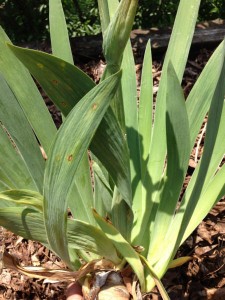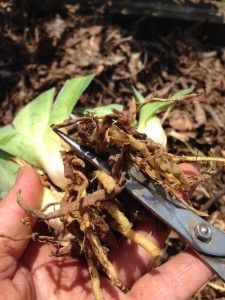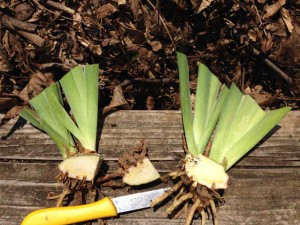The first thing you should know about dividing iris is that iris are tough. Most iris can withstand an amazing amount of neglect and rough handling. This is not to say you should abuse your iris, but you also don’t need to worry too much when you are working with them.
Most planting guides recommend that you divide iris about 3-4 weeks after they have finished blooming. There’s a high likelihood that they will not bloom the year after you divide and transplant them. They are just settling into their new home; you didn’t kill them!
Iris grow from rhizomes (the solid part between the leaves and the roots) . Each iris rhizome will bloom only once – and this rhizome is largest right after the flowers are done blooming. When your iris are getting crowded, you can often see the rhizomes, sticking out of the ground a little. The fact t he rhizomes are so shallow makes them really easy to dig up. The easiest way is to use a fork — simply insert the fork near the edge of the rhizome and wiggle it around a little and it will pop up easily.
he rhizomes are so shallow makes them really easy to dig up. The easiest way is to use a fork — simply insert the fork near the edge of the rhizome and wiggle it around a little and it will pop up easily.
Brush the dirt off so you can see the rhizome and have an idea of what you are working with. Some guides suggest that you’ll need to get out the hose and thoroughly clean the rhizome. There’s no harm in doing that, but it won’t make a bit of difference if you skip this step.
 Trim back the leaves to about 3 inches. You can cut them into any shape you want, straight across or fans, even zigzag! Then trim all the roots to about an inch long below the rhizome and
Trim back the leaves to about 3 inches. You can cut them into any shape you want, straight across or fans, even zigzag! Then trim all the roots to about an inch long below the rhizome and
Cut or break off your baby iris rhizomes from the center ‘mother’. If there are no new babies on the mother yet, plant the mother.
Most likely there will be many more iris then you have space in the old location, either plant them in a new spot or share the extras with your friends and neighbors. 
To plant, insert your rhizomes up to its neck into the ground and water them in. You should not be able to see any part of the rhizome sticking up.
I know you’ve heard that the rhizomes should be above the ground and ‘be kissed by the sun’. If you plant them too high, they are much more likely to #1 fall over and uprooted on the new roots they are developing and #2 dry out and die. Pretty much all iris nurseries and hybridizers from Canada to Australia plant their iris ‘to the neck’.
